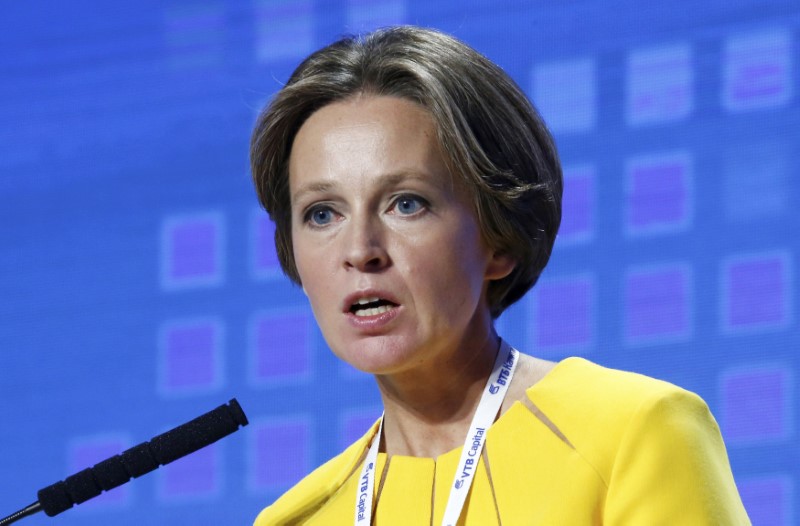By Katya Golubkova
MOSCOW (Reuters) - Russia's use of credit ratings to determine which banks may be trusted to hold state funds should help ensure the health of the banking sector following a clean up by the central bank, the head of Russian rating agency ACRA said.
Ekaterina Trofimova also told Reuters last year's rescue of three of the country's biggest private banks -- Otkritie, B&N and Promsvyazbank (PSB) -- showed that deposits and accounts could be at risk even if a lender is relatively large.
"After last year's events in the banking sector ... it became clear ... that the size of a bank is not the factor which would fully protect the funds," Trofimova said in a written reply to questions.
She said qualitative criteria such as ratings should also be used to determine what state resources a bank can access.
ACRA was established after the top three rating agencies downgraded Russia following the annexation of Crimea in 2014 and has been promoted by the Russian government and central bank.
Prior to the takeover of Otkritie, then Russia's biggest private bank, B&N and PSB in 2017, Russia's central bank had shut dozens of smaller lenders as part of a wider clean-up of a banking sector hit hard by plunging oil prices and sanctions.
Central bank governor Elvira Nabiullina introduced new rules last year that mean state entities will only be able to invest funds in banks with strong ratings from the two Russian ratings agencies -- ACRA and Expert RA.
To access the widest range of state funds and instruments, the banks will also need to meet certain criteria on the capital size and some other requirements.
Eligibility to hold funds of state entities effectively gives a bank access to cheaper cash.
Otkritie, which was taken over at the end of August, had seen a large outflow in client funds after it was assigned a low rating by ACRA.
The central bank has said it expects to spend around a trillion rubles bailing out Otkritie, B&N and PSB.
Nabiullina has said Otkritie and B&N will eventually be floated on the stock exchange as the state seeks to reduce its role in the sector, of which it now controls about 66 percent.
There are still over 500 banks in Russia, led by state-owned Sberbank and VTB.
Trofimova said the switch to using ratings would benefit mid-sized private and 'financially stable' banks, improving the sector's health in general. She said a probation period would be needed for the changes but did not indicate a timeframe.
RATIONALE
The Russian state and state-owned companies had about 5.9 trillion rubles ($105 billion) in Russian bank accounts at the start of this year, more than one-fifth of the total funds by the legal entities which the banks hold, Nabiullina has said.
"It is obvious that the state should minimize the risk of losing its funds," Nabiullina said this week. "Measuring by the size of the capital and by the state's stake gives advantages to the large banks ... and does not always give a full protection."
In a written reply to Reuters questions, Trofimova said that given the variety of the state tools, the access to them secured by a bank's ratings could differ depending on the conditions.
Alexei Moiseev, a deputy finance minister, said this week that the government has proposed a minimum A- rating for banks to access the full range of state funds.
It is not yet clear if ratings from the both agencies -- ACRA and Expert RA -- would be needed to access all or some of the state funds.
